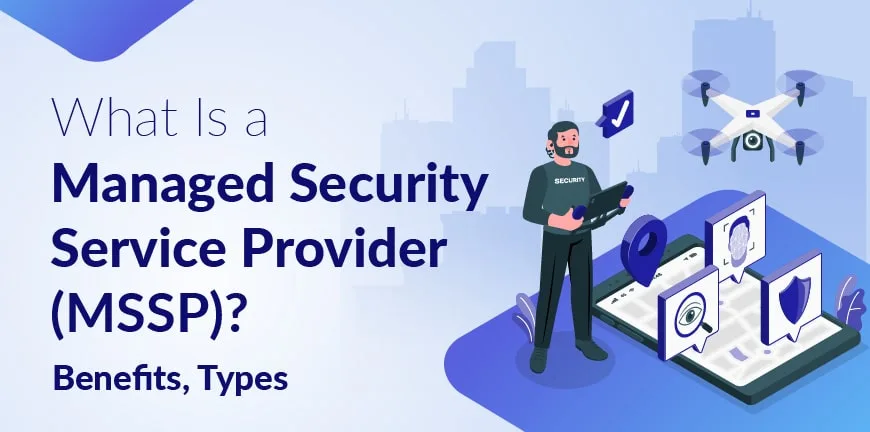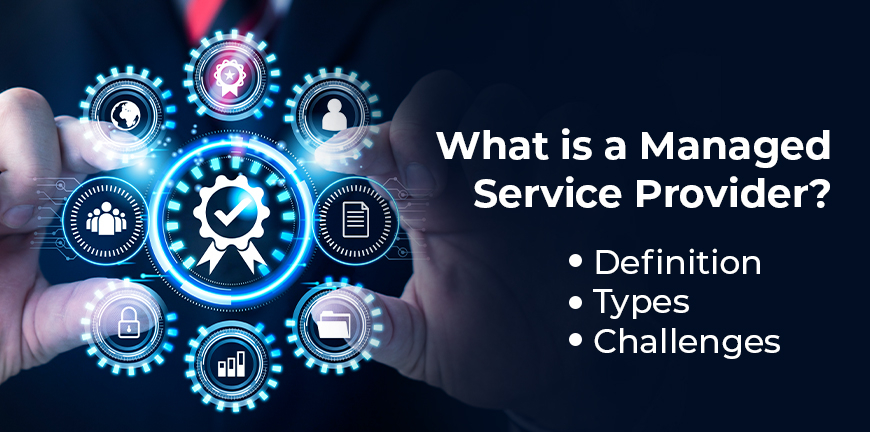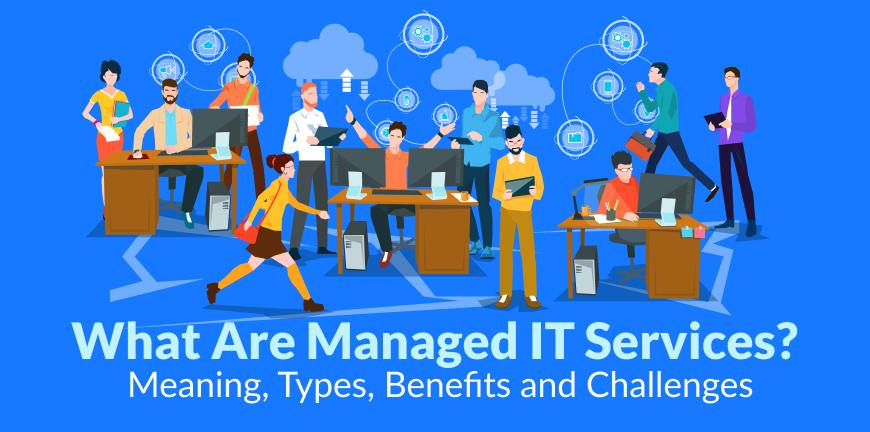
How Much Does It Cost to Outsource Payroll in 2026?
08/07/2025
The Workforce of Tomorrow: Preparing for Gen Z and Beyond
11/07/2025- What Is a Managed Cybersecurity Service?
- Why are Managed Security Services Important?
- What are the Benefits of Using an MSSP?
- What is the Difference Between an MSSP and an MSP?
- What are the Types of Managed Cybersecurity Services?
- How Organisations Use Managed Cybersecurity Services?
- MSSP vs. In-House Security: Which Is Better?
- How to Choose a Managed Security Service Provider?
- Key Takeaways
- Frequently Asked Questions (FAQs)
It is estimated that by 2028, the collective data movement across humanity will reach approximately 394 zettabytes. As dependency on digital execution and management platforms continues to rise exponentially, the instances of cyberattacks and their severity have also skyrocketed, creating the requirement for a robust cybersecurity system that is resilient as well as adaptable to combat emerging threats from 360 perspective.
Moreover, IMF studies have proposed that by 2027, the investment required for compensating for the damages caused by cyberattacks will reach $27 trillion, making it challenging for businesses across the world to maintain business continuity and brand reputation.
To manage cybersecurity systems around the clock that align with business needs without a huge investment, companies are partnering with agencies that offer affordable end-to-end cybersecurity solutions that can be customised and scaled on demand.
The companies that provided this uninterrupted security services are known as Managed Security Service Providers (MSSP). Let’s understand the managed cybersecurity service meaning, its importance, benefits, types, etc., in detail so that companies can make informed decisions on the right choice of MSSP for better outcomes.
What Is a Managed Cybersecurity Service?
MSSP definition states that ” A managed security service provider (MSSP) is an outsourcing firm or an agency that offers cybersecurity monitoring and management solutions for all types of companies and establishments that use sensitive data for running business operations from start to end”.
The common services offered under MSSP include:
- Firewall Management
- Vulnerability Management
- Security Information & Event Management (SIEM)
- Intrusion Detection and Prevention
- Endpoint Detection and Response (EDR)
- Virtual Private Network (VPN) Management
- Incident Response, and many more.
MSSPs utilise fully equipped third-party data centres or in-house security operation centres to provide 24/7 services designed to reduce the administrative burden for companies, improve security posture, address and mitigate threats in real time, enhance operational efficiency, etc.
Why are Managed Security Services Important?
The managed cybersecurity service meaning clearly indicates that it makes a huge difference when it comes to using a holistic approach to protect data and systems from cyberthreats of all kinds and severity levels. Here are the reasons that shed light on the importance of Managed Security Services:
1. Combat threats that are increasingly becoming more sophisticated
The top cyber threats that can attack vulnerabilities in security systems and cause business disruptions include Ransomware, phishing, cloud intrusions, Distributed Denial of Service (DDOS) attacks, device attacks, etc.
These threats are becoming more sophisticated over the years due to AI introduction, intelligent hackers with a thirst for making quick money, increased use of the dark web, etc. Strengthening business cybersecurity defences has become non-negotiable, and MSSPs are playing a crucial role in addressing and mitigating sophisticated threats in real time.
2. Gain access to readily usable, cost-effective cybersecurity solutions
Deploying an in-house security system and a professional team can be expensive and not sustainable over long periods. One of the top benefits of managed cybersecurity services is that companies can readily access an experienced professional team equipped with high-end technology at an affordable price to improve their security posture in real time.
3. Getting 360° security coverage
As there is availability of different types of managed cybersecurity services, companies can gain 360° security coverage that targets network security, cloud security, application security, endpoint security, and so on. Through MSSP deployment, organisations can minimise vulnerability exposure, boost security infrastructure, & manage data seamlessly, resulting in better security and higher operational efficiency.
4. Maintaining brand reputation and trustworthiness
By handing over cybersecurity tasks &responsibilities to MSSPs, companies can maintain brand reputation and increase stakeholder and customer trust, as MSSPs have expertise and experience in mitigating evolving cybersecurity threats at an early stage without causing any business disruption.
5. Comply with Complex Regulations
As cyberthreats are taking sophisticated pathways to create havoc, the regulatory frameworks are also getting more complex, making it challenging for companies to tackle them using an internal crew. Through MSSPs, companies will be able to synchronise their security protocols & practices with domestic and internationally accepted regulatory standards such as GDPR (General Data Protection Regulation), Information Technology Act, 2000, etc.
What are the Benefits of Using an MSSP?
The key benefits of managed cybersecurity services offered by top MSSPs like ALP Consulting include:
1. 24/7 Threat Detection and Response
MSSPs offer 24/7 threat detection and response services at reduced costs to help companies nullify cyberattacks that can occur from any corner of the world at any time.
2. Expanded Security Team with Specialised Skill Sets
Partnering with an MSSP allows companies to gain access to an extended security professional team with specialised expertise that can be scaled up and down on demand. This arrangement reduces the need to deploy an expert internal cybersecurity team and minimises costs on training.
3. Rapid Incident Response
A proactive retaliation to cyberattack incidents is non-negotiable as it minimises financial and operational damage & isolates the threat for better containment. MSSPs have a ready-to-be-deployed incident response team that can confine and mitigate incidents in real time, helping companies maintain business operations without disruptions.
4. Optimised Security Stack
Implementing a streamlined cybersecurity stack that can tackle threats of any severity can be complex & involve a high investment. Managing cybersecurity internally is not a pushover and requires diligent efforts from every nuke & corner. Therefore, partnering with MSSPs can help companies gain immediate access to optimised security solutions equipped with a quiver of strategies with capabilities of neutralising highly sophisticated cyberthreats with relative ease.
5. Reduced Total Costs of Cybersecurity
Cybersecurity is an expensive affair involving high-end technology integration, costly licenses, and an expert security team capable of providing 24/7, relentless protection. By partnering with an MSSP, companies can significantly reduce the total costs of cybersecurity management. These solutions are designed for multitenancy, where one security platform can support multiple clients.
What is the Difference Between an MSSP and an MSP?
The table below sheds light on the difference between MSSP and MSP from aspects of focused areas, capabilities, compliance, etc.
| # | Aspect | MSSP (Managed Security Service Provider) | MSP (Managed Service Provider) |
| 1 | Primary Focus | Focuses mainly on security monitoring & threat response services. | Focuses primarily on managing IT infrastructure & user support tasks. |
| 2 | Key Capabilities | Offers advanced threat detection & incident response capabilities. | Offers routine maintenance, backups, & network management services. |
| 3 | Operations | Delivers a 24/7 security operations centre for cyber risk management. | Provides helpdesk support during operating hours or on demand. |
| 4 | Compliance Approach | Deploys compliance controls to align operations with regulations. | Manages software updates, hardware provisioning, & system uptime. |
| 5 | Specialization | Specialises in cybersecurity tools like SIEM and vulnerability scanning. | Specialises in productivity tools like email, ERP, and CRM. |
What are the Types of Managed Cybersecurity Services?
Here are the different types of managed cybersecurity services offered by most agencies:
1. Managed Detection & Response (MDR)
This MSSP service amalgamates human expertise with high-end technology to offer 24/7 threat monitoring, detection, and response capabilities.
2. Managed Firewall Services
The MSSPs will provide round-the-clock services related to the proactive monitoring and management of clients’ firewall infrastructure. The expert team will analyse network traffic to understand behavioural patterns and create security measures accordingly. The team also makes sure the latest patches & updates are installed promptly.
3. Security Information and Event Management (SIEM)
It is a robust cybersecurity solution that gives companies to bird’s eye view of the security landscape by assimilating, analysing, and correlating security data from different sources. SIEM services act as a first line of defence against incoming threats and cyberattack events. These services will help identify a breach or compromise that might go undetected otherwise.
4. Endpoint Protection
This MSSP solution encompasses securing the physical network of devices like laptops, tablets, mobile devices, and desktops from incoming cyberthreats. This security arrangement is useful in working environments that run on remote and hybrid models. The expert team utilises state-of-the-art encryption techniques, & antivirus malware protection mechanisms to safeguard data against leaks, breaches, and unauthorised access.
5. Vulnerability Management
Typically, cybercriminals possess the knack to hit vulnerable spots in the security network. Vulnerability management MSSP solution helps in detecting, classifying, and addressing vulnerabilities in the IT environment to reduce and eliminate security risks proactively.
How Organisations Use Managed Cybersecurity Services?
Here are the steps used by companies to engage MSSPs to generate the best outcomes:
1. Risk Assessment & Planning
Companies will engage MSSPs to evaluate current cybersecurity risks looming over the security system, identify vulnerabilities, and create a multifaceted security roadmap tailored to safeguard critical assets and sensitive data against cyberthreats of all severities and varieties.
2. Organised Deployment of Security Technologies
The MSSPs will integrate security tools such as firewalls, intrusion detection systems, endpoint protection, to SIEM platforms across all business operations without altering the working mechanism. This ensures continuous monitoring, automated alerts, and efficient incident containment across the organisation’s infrastructure.
3. 24/7 Monitoring & Threat Detection
Cybersecurity experts from MSSP agencies will monitor networks & systems around the clock. They will identify dubious activities, interpret threat intelligence feeds, & respond to incidents before attackers can exploit vulnerabilities or cause serious damage.
4. Incident Response and Recovery
When security breaches are triggered, MSSPs will deploy an incident response team to investigate attacks, contain threats in real time, eliminate malicious presence, and help restore systems to their last stable state. This shortens downtime & reduces negative impact in terms of financial, legal, and brand aspects.
5. Continuous Improvement & Reporting
MSSPs have mechanisms that enable companies to receive audit-friendly reports that detail threats detected, severity levels, incidents handled, compliance status, & recommendations. This facilitates continuous improvement of security posture and ensures alignment with evolving risks and business needs.
MSSP vs. In-House Security: Which Is Better?
Here is a detailed comparison between MSSP & In-House Security:
| Aspect | MSSP (Managed Security Service Provider) | In-House Security |
| Expertise & Resources | Companies gain instant access to specialised security experts and advanced solutions without deploying large teams. | Relies on internal staff skills; may lack breadth of specialised expertise. |
| Cost Structure | Predictable subscription costs; lower upfront investment in tools and infrastructure. | High upfront investment in tools, training, and continuous maintenance. |
| Scalability | Easily scales to meet new threats and growing infrastructure demands. | Scaling requires significant hiring, training, and additional resources. |
| 24/7 Monitoring | Around-the-clock monitoring with dedicated security operations centres (SOCs). | Requires staffing shifts to maintain a continuous monitoring capability. |
| Control & Customization | Less direct control over processes and response protocols compared to internal teams. | Full control over policies, processes, and incident response strategies. |
Based on the above comparison, we can conclude that MSSP offer more benefits than in-house security management in the long run.
How to Choose a Managed Security Service Provider?
Here are the steps to be followed by companies to choose the right MSSP:
1. Assess Business Security Needs
Evaluate the organisation’s risks from end-to-end, compliance mandates, and current security vulnerabilities. Based on this data and previous reports, create a detailed security management map and services required to counter security threats from 360 perspective.
2. Verify and Validate Experience and Expertise
Run a detailed verification process to validate the MSSP’s previous track record, industry certifications & sector-specific expertise. Additionally, ensure they have a qualified expert team with proven success in managing security threats at different severity levels.
3. Evaluate Technology and Capabilities
Companies must assess and review the security framework, tools, monitoring platforms, & threat intelligence capabilities of the MSSPs in reckoning. Also, confirm their compatibility with the firm’s current security infrastructure and make sure they can be scaled as the business grows.
4. Review Service Level Agreements (SLAs)
Companies must examine SLAs carefully, including guaranteed response times, reporting frequency, data sharing and management policies, & performance metrics. Setting clear SLAs will help avoid misunderstandings at a later stage.
5. Consider Support and Communication
Companies looking for managed security services must ensure the MSSP offers 24/7 support with clear escalation procedures & dedicated account managers. Also, effective communication channels are critical during security incidents and routine reporting.
Key Takeaways
- MSSPs deliver 24/7 cybersecurity monitoring, detection, and response without heavy in-house investments.
- They help businesses combat sophisticated threats, comply with regulations, and protect brand reputation.
- MSSPs offer scalable, cost-effective solutions like SIEM, MDR, and endpoint protection services.
- Choosing the right MSSP requires assessing needs, verifying expertise, and reviewing SLAs carefully.
- Compared to in-house security, MSSPs provide broader expertise, scalability, and predictable costs.
Frequently Asked Questions (FAQs)
1. What does a managed cybersecurity service mean?
Managed cybersecurity service meaning is quite straightforward, and it states that “A managed cybersecurity service delivers continuous security monitoring, threat detection, and incident response, outsourced to expert providers with specialised tools”.
2. How MSSPs Support Different Business Needs?
MSSPs offer tailored services like compliance support, threat hunting, and endpoint protection to match unique security requirements across industries and sizes.
3. How does an MSSP differ from an MSP?
MSSPs focus exclusively on cybersecurity, whereas MSPs handle broader IT functions like networks, infrastructure, and general technology management.
4. Why Do Businesses Use MSSPs?
Businesses utilise MSSPs to access advanced security expertise, reduce costs, improve compliance, and ensure 24/7 protection against evolving threats.
5. How much does an MSSP cost?
The costs of using MSSP services vary widely depending on services, organisation size, and complexity.
Contact Us For Business Enquiry

Amit Saproo
Amit Saproo is the Head of Operations at ALP Consulting with nearly 17 years of experience in Executive Search, RPO, Leadership, and IT & Engineering recruitment. He leads nationwide recruitment programs across Technology, BFSI, and R&D domains, driving strategic hiring solutions for diverse client needs. Amit excels in building and managing high-performance teams that deliver scalable, end-to-end recruitment and consulting services.



